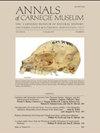An Assemblage of Fleas (Siphonaptera) From Canada, México, and the United States of America, in the Hastriter Collecton (Brigham Young University)
IF 0.9
4区 地球科学
Q4 PALEONTOLOGY
引用次数: 0
Abstract
ABSTRACT An accumulation of fleas that constitute the Hastriter flea collection includes accounts/records of 167 species over 48 years. These officially belong to the Brigham Young University flea collection. They are summarized in this treatise with identifications of new state, county, and provicincial records from the United States, Canada, and some species that extend south into México. Records included are represented by eight families that are presented in alphabetical order (Ceratophyllidae, Ctenopthalmidae, Hystrichopsyllidae, Ischnopsyllidae, Leptopsyllidae, Pulicidae, Rhopalopsyllidae, and Vermipsyllidae). Major synonomies are provided with each species (excluding very common and cosmopolitan species) with major political subdivisions following each reference/pagination. Two appendices are included that list important references (not included in synonomies) (Appendix I) and a listing of synonyms for the family Ceratophyllidae (Appendix II). Four tables are included that list new geographical records and one table that notes new host records. Seventy-eight flea species (some of the same species were new for different state, county and provincial records) accounted for 129 new U.S. state or Canadian provincial records. These also included 12 new state records. An additional 15 new host records for 13 different flea species were documented. To aid future investigations, significant research findings such as disease investigations, zoonotic disease control measures, seasonal bionomics, et cetera are annotated in the remarks.来自加拿大、墨西哥和美国的蚤类(管翅目),Hastriter collection (Brigham Young University)
Hastriter蚤类标本收集了48年来167种蚤类的记录。这些正式属于杨百翰大学跳蚤收藏。在这篇论文中,对它们进行了总结,并对来自美国、加拿大的新州、县和省的记录进行了鉴定,以及向南延伸到墨西哥的一些物种进行了鉴定。收录的记录由8个科按字母顺序排列(角鼻虫科、栉鼻虫科、Hystrichopsyllidae、Ischnopsyllidae、Leptopsyllidae、Pulicidae、Rhopalopsyllidae和Vermipsyllidae)。每个物种(不包括非常常见和世界性的物种)都提供了主要的同义词,并在每个参考/分页之后提供了主要的政治细分。包括两个附录,列出了重要的参考文献(未包括在同义词中)(附录I)和角鼻苔科的同义词列表(附录II)。包括四个表,列出了新的地理记录和一个表,记录了新的宿主记录。78种跳蚤(一些相同的物种在不同的州、县和省记录中是新的)占129个新的美国州或加拿大省记录。其中还包括12项新的州记录。另外还记录了13种不同蚤种的15个新的寄主记录。为了帮助未来的调查,重要的研究成果,如疾病调查,人畜共患疾病控制措施,季节性生物学,等等都在备注中注释。
本文章由计算机程序翻译,如有差异,请以英文原文为准。
求助全文
约1分钟内获得全文
求助全文
来源期刊

Annals of Carnegie Museum
综合性期刊-动物学
CiteScore
2.50
自引率
18.20%
发文量
4
审稿时长
>12 weeks
期刊介绍:
Annals of Carnegie Museum is a quarterly journal that publishes peer-reviewed short and medium-length original scientific contributions in organismal biology, earth sciences, and anthropology, in 40 by 52.5 pica format (168 by 220 mm or 6-5/8 by 8-5/8 inches). Subject matter must be relevant to Carnegie Museum of Natural History scientific sections or Powdermill Nature Reserve (PNR), preferably with connection to the Carnegie collection and/or personnel. Carnegie Museum staff and research associates receive publication priority, but others are encouraged to submit papers, especially those manuscripts explicitly based on the Carnegie collection.
 求助内容:
求助内容: 应助结果提醒方式:
应助结果提醒方式:


